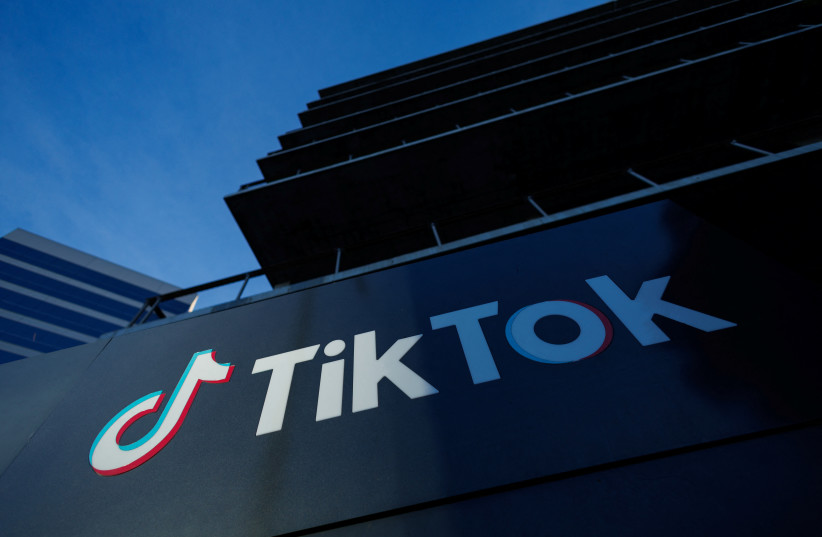On October 11, merely four days after Hamas and Palestinian civilians committed mass slaughter, gang-raping and pillaging our communities in the South, I did what most content creators do and turned to social media to showcase the worst reality Israel has ever faced.
Devastated and in shock after watching the slaughter of my people, I said to my TikTok audience, “For those asking if Jewish people are okay, how can we ever be okay? How can we ever be okay watching a thousand of our people being ruthlessly murdered, raped, burned, and beheaded? How can we ever be okay knowing that innocent Israelis, including babies and the elderly, are being held captive in Gaza? Jewish people are NOT okay.”
Just hours after posting it, TikTok placed a warning label on my video: “Caution: Video flagged for unverified content.”
I couldn’t believe it. Hamas admitted, published, and live-streamed their crimes on Facebook and Telegram, yet TikTok put a warning label on my video, marking me as a liar to anyone who would watch my video.
TikTok has been fueling antisemitism for years, so it should come as no surprise that the platform began flagging content about the atrocities committed against Israelis. Many creators have complained that it suppresses voices in Israel, especially when they compare the performance of their content on other apps. The battle over antisemitism on social media exists on every platform but there is something scary about watching how it is manifesting on TikTok.

Antisemitism is surging on social media
Antisemitism on social media has become worse following the October 7 atrocities. Results of a survey published in November suggested that for every half hour that someone watches videos on TikTok, they became 17% more likely to agree with antisemitic statements like “Jewish people chase money more than other people do.”
The survey was commissioned by Generation Lab, a research company specializing in the views of young people. Anthony Goldbloom, who helped commission the study, wrote that the “connection to antisemitism is far more pronounced among TikTok users than those of other major social media platforms” and explained that the reasoning could be attributed to a higher concentration of pro-Palestinian content or to TikTok’s amplification of more sensationalist content.
We know that the antisemitism on social media has real-time consequences. Following Hamas’s October 7 attacks, the Anti-Defamation League (ADL) recorded a 10x increase in antisemitic incidents on US college campuses. The rise of antisemitism on campus was happening in parallel to the surge of content on TikTok about the Hamas-Israel war. At its peak, according to the commission report, 98.6% of US views on TikTok of content related to war carried a pro-Palestinian hashtag. These numbers do not reflect the general public opinion about Israel and Hamas, even among the younger generation.
Fox News featured a report by anonymous Jewish employees at TikTok who spoke out about their toxic work environment following the October 7 and that their company had set up support groups for Palestinian employees but claimed that they could not provide such an option for employees connected to Israel because it was “too political.”
While content moderators will never be able to keep up with an armed conflict, the screenshots leaked by employees from TikTok show that they openly promote the anti-Israel Boycott, Divestment and Sanctions (BDS) movement, celebrate Hamas’s atrocities and use the watermelon emoji – which mirrors the colors as the Palestinian flag – in some form or another.
When comparing the Israel-Hamas war to other conflicts on TikTok, researchers from The Wall Street Journal have reported that there was less ambiguity in the Western world about taking sides in Russia’s invasion of Ukraine.
There doesn’t seem to be any conclusive proof that TikTok is skewing content in any political direction, but there is no doubt that the Chinese-owned platform has a huge antisemitism problem. Antisemitism and anti-Israel sentiment have become rampant on the Chinese Internet and in state-run media following the October 7 attacks.
Jewish creators on the app receive an avalanche of hate, even for just sharing religious and cultural content, and many pro-Israel creators have had their content censored or their accounts shut down. Meanwhile, shared screenshots by Jewish employees of TikTok support the claims that the moderators allow hateful content against Jewish users and anti-Israel sentiments to slip through the cracks.
The ease with which Al-Qaeda leader Osama Bin Laden’s “Letter to America” was able to go viral on TikTok, with creators justifying one of the worst terror attacks in the United States that killed 3,000 Americans, shows us how TikTok has been able to teach an entire generation to hate their country.
TikTok has changed our society in the way industries operate. It has shaped Western culture and trends, and many rely on TikTok for income. Calling for its ban in the United States is not an easy thing to do by any means, but we cannot ignore the severe hate and racism that is emanating from the platform.
I don’t know the answer, but I will say that the conversation related to TikTok needs to include a discussion on its antisemitism problem.
We know that TikTok is shaping the minds of young Americans, and we have seen it drive political sentiment, especially anti-American sentiment. It took about 10 years of propaganda to shape the minds of Germans leading up to the Holocaust. Imagine the damage that TikTok can do if the company cannot address the same propaganda circulating on its platform.
As it stands now, we should all be worried about the future of America and Western civilization if we continue down this rabbit hole and don’t address the real concerns coming from this platform.
The writer is a social media activist with more than 10 years of experience working for Israeli and Jewish causes and cause-based NGOs. She is the co-founder and COO of Social Lite Creative, a digital marketing firm specializing in geopolitics.
